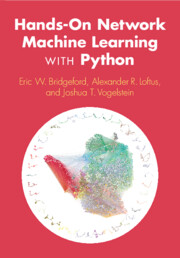Book contents
- Frontmatter
- Contents
- Preface
- Terminology
- Part I Foundations
- Part II Representations
- Part III Applications
- 6 Applications for a Single Network
- 7 Applications for Two Networks
- 8 Applications for Multiple Networks
- 9 Deep Learning Methods
- Appendix A Network Model Theory
- Appendix B Learning Representations Theory
- Appendix C Overview of Machine Learning Techniques
- Index
9 - Deep Learning Methods
from Part III - Applications
Published online by Cambridge University Press: 23 September 2025
- Frontmatter
- Contents
- Preface
- Terminology
- Part I Foundations
- Part II Representations
- Part III Applications
- 6 Applications for a Single Network
- 7 Applications for Two Networks
- 8 Applications for Multiple Networks
- 9 Deep Learning Methods
- Appendix A Network Model Theory
- Appendix B Learning Representations Theory
- Appendix C Overview of Machine Learning Techniques
- Index
Summary
This chapter explores deep learning methods for network analysis, focusing on graph neural networks (GNNs) and diffusion-based approaches. We introduce GNNs through a drug discovery case study, demonstrating how molecular structures can be analyzed as networks. The chapter covers GNN architecture, training processes, and their ability to learn complex network representations without explicit feature engineering. We then examine diffusion-based methods, which use random walks to develop network embeddings. These techniques are compared and contrasted with earlier spectral approaches, highlighting their capacity to capture nonlinear relationships and local network structures. Practical implementations using frameworks such as PyTorch Geometric illustrate the application of these methods to large-scale network datasets, showcasing their power in addressing complex network problems across various domains.
Keywords
Information
- Type
- Chapter
- Information
- Hands-On Network Machine Learning with Python , pp. 377 - 410Publisher: Cambridge University PressPrint publication year: 2025
Accessibility standard: WCAG 2.1 A
Why this information is here
This section outlines the accessibility features of this content - including support for screen readers, full keyboard navigation and high-contrast display options. This may not be relevant for you.Accessibility Information
Content Navigation
Allows you to navigate directly to chapters, sections, or non‐text items through a linked table of contents, reducing the need for extensive scrolling.
Provides an interactive index, letting you go straight to where a term or subject appears in the text without manual searching.
Reading Order & Textual Equivalents
You will encounter all content (including footnotes, captions, etc.) in a clear, sequential flow, making it easier to follow with assistive tools like screen readers.
You get concise descriptions (for images, charts, or media clips), ensuring you do not miss crucial information when visual or audio elements are not accessible.
